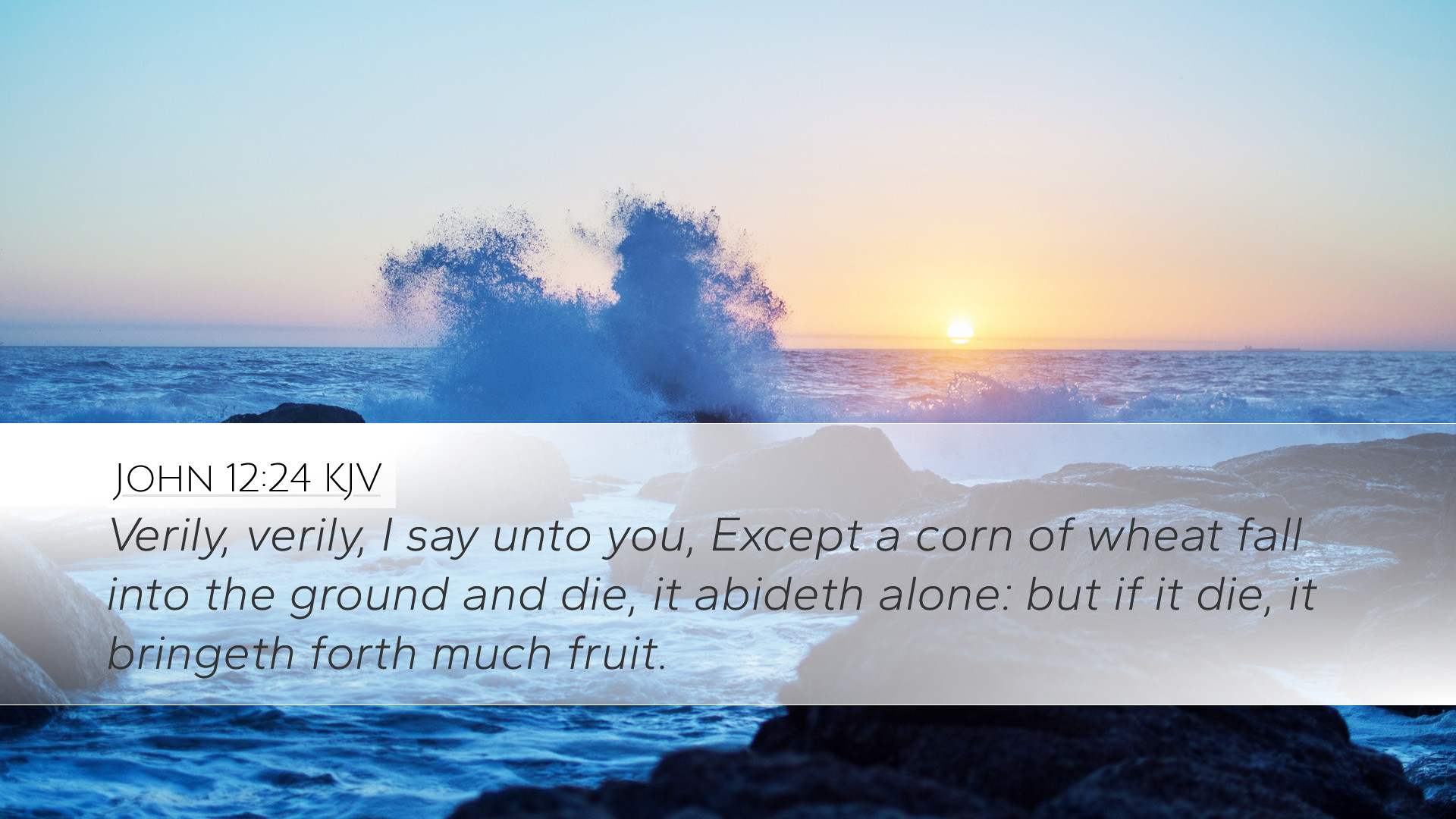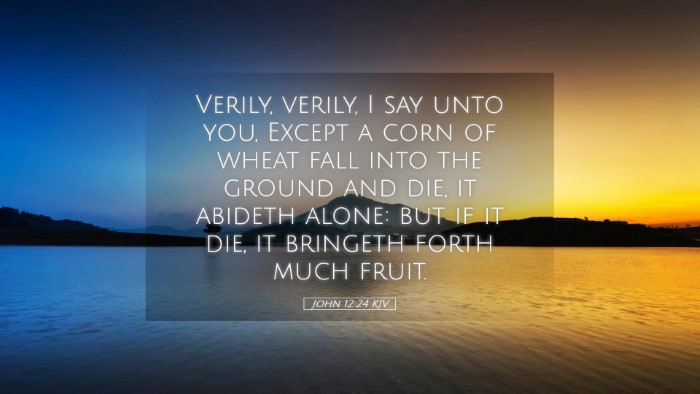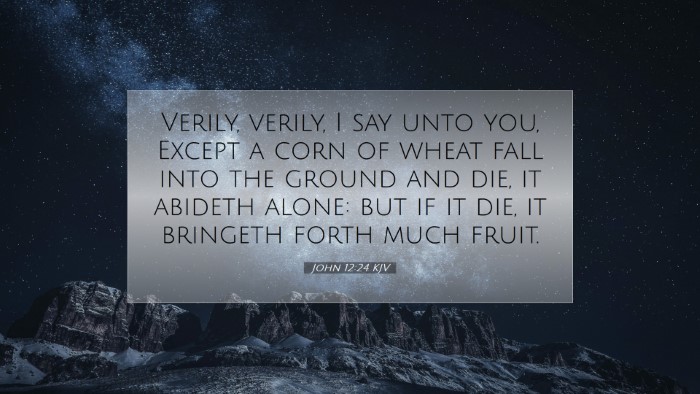Bible Commentary on John 12:24
Verse: "Verily, verily, I say unto you, Except a corn of wheat fall into the ground and die, it abideth alone: but if it die, it bringeth forth much fruit."
Introduction
John 12:24 is a pivotal scripture that encapsulates the principle of sacrifice and resurrection. This verse represents a profound spiritual truth that resonates with the themes of death and life, sacrifice, and the fruitfulness resulting from that sacrifice.
Exegesis of John 12:24
This passage highlights the necessity of death for the sake of new life. The imagery of a grain of wheat is significant; it serves as a metaphorical expression of Jesus' impending crucifixion and the glorious resurrection that will follow. As we dive into the details of this verse, we will explore insights from various public domain commentaries.
1. Matthew Henry's Commentary
Matthew Henry emphasizes the reality of spiritual truths found within natural illustrations. He notes that just as a grain of wheat must die to bring forth fruit, so too must the life of Christ yield to death to produce believers through salvation.
- Transformation through Death: Henry argues that the death of Christ is not an end but a means to a greater beginning—the resurrection and the establishment of the church.
- Fruitfulness of Believers: This death enables not only the transformation of Christ but also encourages Christians to follow in His footsteps, emulating His selfless nature, resulting in spiritual multiplication.
2. Albert Barnes' Notes on the Bible
Albert Barnes provides an exegesis that delves into the implications of this verse for the followers of Christ. He articulates that the principle of dying to self is essential for spiritual growth and effectiveness in ministry.
- Application of the Principle: Barnes draws a parallel between Jesus' sacrifice and the personal sacrifices Christians must make to spread the gospel and build the kingdom of God.
- The Promise of Fruitfulness: He emphasizes that the ‘much fruit’ signifies not only the conversion of souls but also the lasting impact of a believer's witness and life.
3. Adam Clarke's Commentary
Adam Clarke's analysis offers an in-depth theological reflection on the necessity of Christ's sacrifice. Clarke elaborates on the Hebrew context and agricultural practices of grain sowing, illustrating the expectation of yield following the process of dying.
- Symbolism of the Grain: Clarke points out that the ‘corn of wheat’ symbolizes Christ Himself, highlighting the divine plan where suffering leads to glory.
- Moral and Ethical Implications: He argues that this passage not only applies to the sacrificial nature of Christ but also calls believers to a lifestyle of sacrificial love and service, thus fulfilling the command to take up one's cross.
Theological Implications
The theological underpinnings of John 12:24 resonate deeply within Christian doctrine. The physical act of dying to self is mirrored by the spiritual resurrection that follows. The verse functions on both a macro (Christ's death) and micro (believers' lives) level, inviting reflection on how death begets life.
1. Sacrifice as a Pathway to Life
All three commentators agree on the necessity of sacrifice. The death of Jesus is not only a historical event but a theological paradigm that informs Christian discipleship. Jesus' life illustrates that to truly live, one must be willing to surrender to God's will.
2. The Concept of Abiding Alone vs. Bearing Fruit
The contrast between 'abiding alone' and 'bringing forth much fruit' serves as a key motivating factor. This principle is not just about survival, but the flourishing of faith and righteousness in the community of believers. The ultimate message is that isolation leads to spiritual stagnation, while self-sacrifice leads to communal growth.
Practical Applications for Believers
In light of John 12:24, several actionable insights emerge for modern believers and church leaders.
- Cultivating a Culture of Sacrifice: Churches should encourage a lifestyle that embraces self-denial for the sake of serving others, fostering an environment where the ‘dying to self’ ethos is celebrated.
- Emphasizing Evangelism: By understanding that witnessing often requires personal sacrifice, congregations can be motivated to engage in outreach with a renewed commitment to Christ's mission.
- Leadership in Vulnerability: Leaders are called to model vulnerability and servanthood, demonstrating that true power lies in humility and sacrifice for the body of Christ.
Conclusion
John 12:24 serves as a profound reminder of the paradox of the Christian faith, where death leads to life, and sacrifice leads to fruitfulness. Through the insights gained from Matthew Henry, Albert Barnes, and Adam Clarke, we see a cohesive understanding of the deeper meanings embedded within this scripture. As leaders, scholars, and believers reflect on this verse, may they embrace the call to die to self, bearing much fruit for the glory of God.


